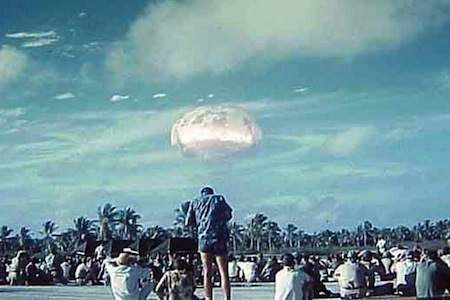A Modest Proposal to House Republicans: Cut the Nuclear Weapons Budget

Nuclear explosion from Operation Dominic -- Shot Questa on May 4, 1962. Credit: U.S. Government.
In the heated debates over the federal deficit, you have said repeatedly that you want to cut it without raising taxes and, therefore, that you must reduce government spending.
If that is the case, I have a suggestion for you: Why not start by cutting the nuclear weapons budget?
According to the Ploughshares Fund, the current plans for nuclear weapons and related programs could cost approximately $640 billion over the next decade. This includes some $352 billion to $392 billion spent by the Defense Department (to sustain, operate, and modernize the U.S. strategic nuclear arsenal) and the National Nuclear Security Administration (for weapons activities, administrative costs, and naval reactors), roughly $97 billion for “missile defense” programs, and about $100 billion for environmental and health costs (i.e. managing and cleaning up radioactive and toxic waste resulting from nuclear weapons production and testing activities, as well as compensating victims of such contamination). I think that you will agree that $640 billion is quite a hefty sum and, as such, merits scrutiny by critics of excessive government spending.
Of course, if there were a good reason for this very large expenditure, it might be worth funding. But is there? After all, the United States today possesses some 7,700 nuclear weapons, about 3,000 of which are slated for retirement). Does it have a clear “enemy,” as during the Cold War? Well, no, it doesn’t. The nearest to possible enemies, in the view of some Americans, are Iran (which has no nuclear weapons) and China (which has a few hundred). Russia, to be sure, possesses about the same number as the United States, but -- despite occasional tensions between the two nations -- Russia seems very unlikely to launch a nuclear attack against this country. Indeed, both nations recently signed a nuclear disarmament agreement (the New START Treaty) under which they are reducing their nuclear arsenals. And how many nuclear weapons are needed to “deter” another nation from attack? In short, the vast and enormously expensive U.S. nuclear weapons production complex is a Cold War dinosaur.
Even more striking, the U.S. government is formally committed to building a nuclear weapons-free world. Speaking in Prague on April 5, 2009, President Barack Obama proclaimed "clearly and with conviction America's commitment to seek the peace and security of a world without nuclear weapons." The nuclear disarmament momentum was continued by a U.N. Security Council “summit,” chaired by the American president, that on September 24, 2009 affirmed its commitment to the goal of a world free of nuclear weapons and established a broad framework for reducing nuclear dangers.
In these circumstances, prudent fiscal managers might well ask why this “big government” program should be sustained and expanded over the next ten years.
Furthermore, it is a program that undermines the very free enterprise system that you praise so lavishly. “Pentagon capitalism,” as the late Seymour Melman (Professor of Industrial Engineering at Columbia University) once observed, corrodes business competitiveness. This cozy government-business relationship leads companies to depend heavily -- and sometimes exclusively -- upon the federal government for their income. Furthermore, the huge military contracts that keep many corporations alive are often awarded without competitive bidding. Comfortable with fat Pentagon contracts and minimum oversight, businesses learn that they can get away with huge cost overruns. In addition, there is the fact that nuclear weapons programs drain some of the nation’s top scientific, engineering, and managerial talent from other, more productive areas of the U.S. economy. Also, of course, if this business product -- the nuclear weapons arsenal -- is never used, it will produce no economic benefit. And, if it is used, it will destroy the world, including the free enterprise system.
Finally, as Republicans in government, you might recall that every Republican president since the advent of nuclear weapons has publicly championed nuclear arms control and disarmament. And some of these presidents -- notably Ronald Reagan, George H.W. Bush, and George W. Bush -- actually presided over substantial reductions of the U.S. nuclear arsenal. It was not Barack Obama but Ronald Reagan -- apparently your favorite modern president -- who, in a speech delivered on January 16, 1984, said: “My dream is to see the day when nuclear weapons will be banished from the face of the earth.”
So why not substantially reduce U.S. nuclear weapons spending? Then, of course, you would not have to cut government expenditures for child nutrition programs, for food stamps, for education, for the environment, for Medicaid, for Medicare, and for Social Security.
Or could it be the case that your real goal is to cut these programs?
Well, I’ll be watching -- as will millions of other Americans -- to see what you do and, thus, what your priorities really are.
Sincerely,
Lawrence S. Wittner

